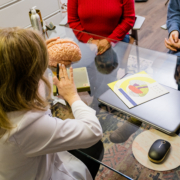The connection between intellectual activity and brain health
In order to spread the word about the importance of intellectual activity and brain health, the National Academy of Neuropsychology (NAN) has compiled information about the intersection of the two in a quick tips video. The video can be found on the new Brain Health Hub section of the NAN website.
The video makes clear that being intellectually engaged may benefit the brain, and that people who practice personally meaningful activities such as volunteering or hobbies, say they feel happier and healthier.
Learning new skills may improve your thinking ability, too.
There’s research to support these claims. According to the National Institute on Aging, one recent study found that older adults who learned quilting or digital photography had more memory improvement than those who only socialized or did less cognitively demanding activities. Other research suggests that engagement in activities such as music, theater, dance, and creative writing has shown promise for improving quality of life and well-being in older adults, from better memory and self-esteem to reduced stress and increased social interaction.
In fact, multiple studies have shown that people who have at least one hobby, even if they only do that hobby occasionally, have a much lower risk of developing dementia such as Alzheimer’s disease.
If you do more than one hobby, each additional one reduces your risk of problems with thinking skills even more.
If you don’t have a hobby right now, that’s OK; learning a new skill is also very helpful for brain health. One way to think about this is, “Be willing to be a beginner again.” Taking on a new activity can be challenging, but the brain really likes new and novel activities. Keep in mind that having a leisure activity you enjoy has many general health benefits, such as reducing your blood pressure, and lowering your stress levels.
One mentally stimulating activity some people like to do is volunteer work. This is not just great for others who get help from your service—your brain benefits too! People who volunteer tend to have better thinking skills, can experience positive brain changes, and are less likely to develop memory problems. Volunteering also is great for boosting your mood, which can also be good for brain health.
Again, for more on this subject, or to review quick tips videos on a variety of other subjects related to brain health, check out the Brain Health Hub section of the NAN website.









